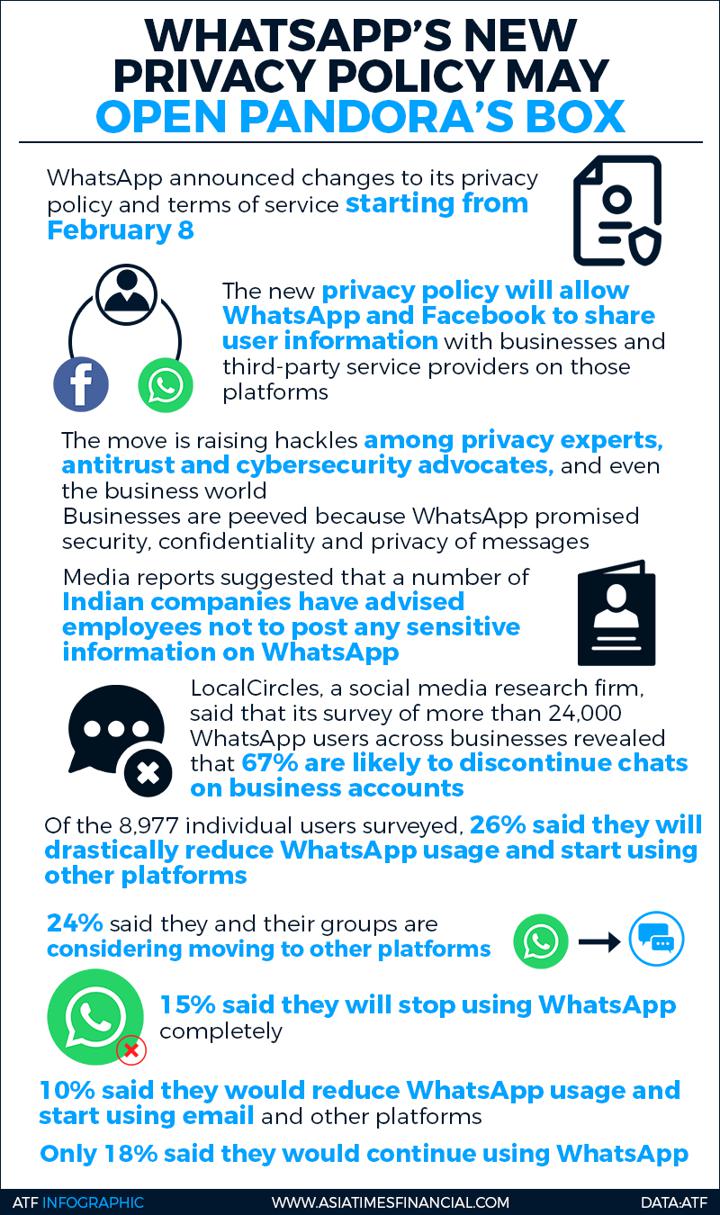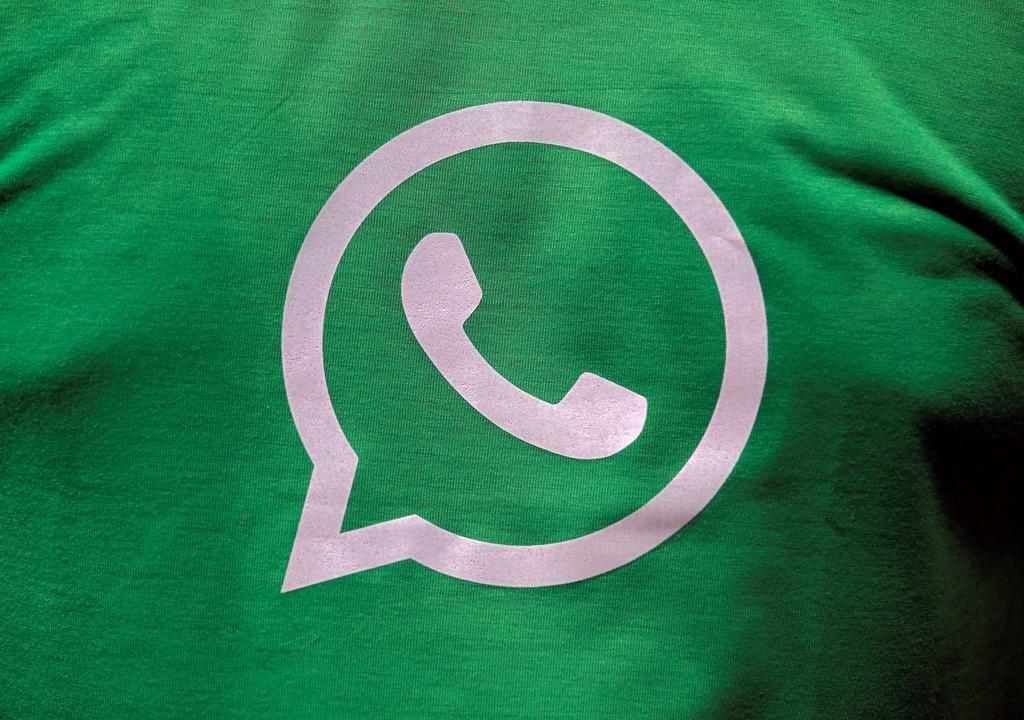(ATF) WhatsApp’s latest policy to force users to agree to sharing information with Facebook, which could then be shared or sold to others, could not only compromise users’ personal data, it could also lead to unexpected problems for business users, experts say.
Most are advising users to shift to other instant messaging systems that still ensure privacy and confidentiality – and hordes have already started moving to rivals such as Signal and Telegram.
Yet some also feel that businesses will soon have to embrace instant messaging in their formal communication system.
On January 4, WhatsApp announced changes to its privacy policy and terms of service starting from February 8 that will allow WhatsApp and Facebook to share user information with businesses and third-party service providers on those platforms.
WhatsApp clarified that personal chats between users will not be shared with Facebook, but the revised privacy norms allow sharing of data on business interactions across the group, underscoring Facebook founder Mark Zuckerberg’s aggressive move to build a messaging commerce powerhouse.
It also stated that users will have to agree to the new terms and policy by February 8, in order to continue using the WhatsApp service.
On the face of it, this change seems fairly innocuous since the messaging company has reiterated that the most important data held by WhatsApp – the user messages – would remain encrypted end-to-end, and no one, including WhatsApp, would have access to them.
Still the move is raising hackles among privacy experts, antitrust and cybersecurity advocates, and even the business world who fear that the data pooling between the technology giants could be very revealing.

Lack of clarity
Besides, this data-sharing could also lead to leakages, and private conversations on WhatsApp may not stay private for long.
“WhatsApp has not clarified how it plans to segregate private and business messages while sharing them,” Sivarama Krishnan, cybersecurity leader at PwC India, told Asia Times Financial.
“According to the policy, business messages would be shared for monetisation by WhatsApp, but that could violate the promise of confidentially and privacy … when messages from a business to its consumers, like an airline updating its fliers over WhatsApp, are shared,” he added.
“It could open up a Pandora’s Box in the process,” Krishnan said. “A lot of business conversations happen privately these days, and differentiating a private message from a business message would be the biggest challenge.”
According to Krishnan, businesses are peeved because WhatsApp promised security, confidentiality and privacy of messages. But the new policy reneges on that promise if WhatsApp is free to monetise the information in its users’ messages.
The global standing of social media has taken a bit of a pounding lately following Twitter shutting access to Donald Trump after he whipped up a mob to overrun the US Capitol in a desperate attempt to stop the certification of his election defeat.
This forced social media to reveal the potentially scary power of internet giants like Facebook and Twitter, in which corporations, not government, get to define the bounds of permissible speech, critics say.
On Tuesday, while commenting on Singapore’s Protection from Online Falsehoods and Manipulation Act that orders news outlets, social media users or platforms to carry warnings that their pages or posts contain false statements, Foreign Minister Vivian Balakrishnan said social media platforms often put “profit above principle”.
This is why the new policy may also spur pushbacks from WhatsApp users that greatly erodes its usage, experts say.
“Many companies were contemplating or had started moving out of WhatsApp even before the policy. The new announcement has accelerated that process,” PwC’s Krishnan said.
Corporate backlash
On Monday, media reports said that bosses at Tata Steel in India sent out an email advising employees not to post any sensitive information on WhatsApp and not to conduct business meetings on the app. Instead, the company’s IT department suggested they use Microsoft Teams for official communication.
Essar Group, another local industrial conglomerate, also directed its top executives to use Microsoft Teams to conduct official business.
“In the past week we have had discussion with at least 100 chief information officers on how to move away from instant messaging services, including WhatsApp, for official communications,” Sanchit Vir Gogia, chief executive of Greyhound Research, told ATF. “Not just local companies, [but] very large global companies are also keen on moving away from instant messaging services have already started the process.”
On Tuesday, LocalCircles, a social media research firm, said that its survey of more than 24,000 WhatsApp users across businesses revealed that 67% are likely to discontinue chats on business accounts if WhatsApp shares user and transaction information with Facebook and third parties.
Worse, of the 8,977 individual users surveyed, 26% said they will drastically reduce WhatsApp usage and start using other platforms, 24% said they and their groups are considering moving to other platforms, 15% said they will stop using WhatsApp completely, and 10% said they would to reduce WhatsApp usage and start using email and other platforms. Only 18% said they would continue using WhatsApp and let them use their data.
“If one goes by the survey findings, WhatsApp could possibly experience 60 million users [in India] dropping out, based on the assumption that 400 million smart-phones in India currently have installed the application,” Sachin Taparia, LocalCircles’ founder, told ATF.
Gogia said that although no business organisation has officially declared WhatsApp, or any other messaging, as official communication tools, more than 90% of business users still use WhatsApp despite the existence of paid alternatives such as Slack, Microsoft’s Office 365, and Google Meet.
“There is a growing realisation in many organisations that instant messaging services are essential communication tools and need to be embraced,” Gogia said. “Although right now the approach is to discourage use of instant messaging services for business communication, but in the long run businesses have to evolve policies to embrace these applications just like business embraced smartphones a few years ago.”
ALSO SEE:
China’s Didi Chuxing teams up with WhatsApp to offer ride-hailing in Brazil
























